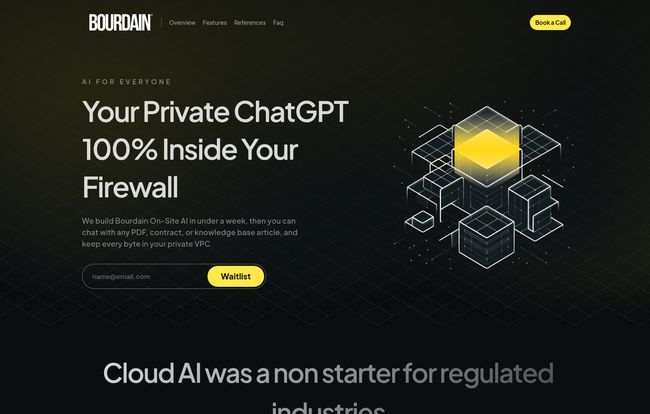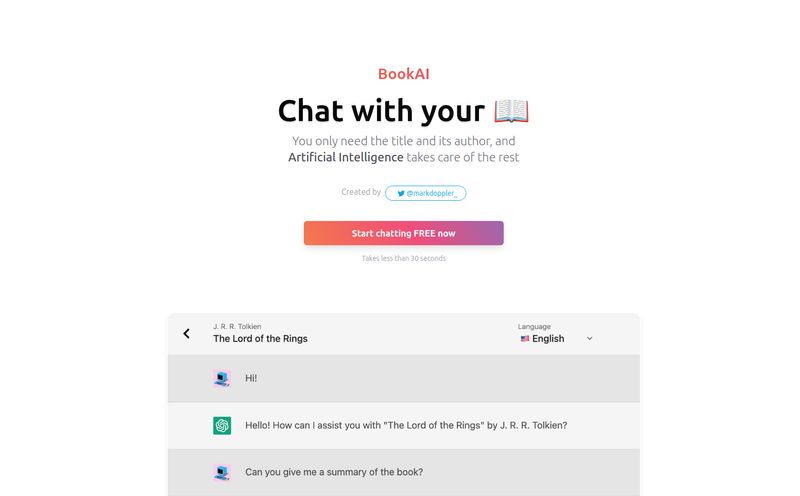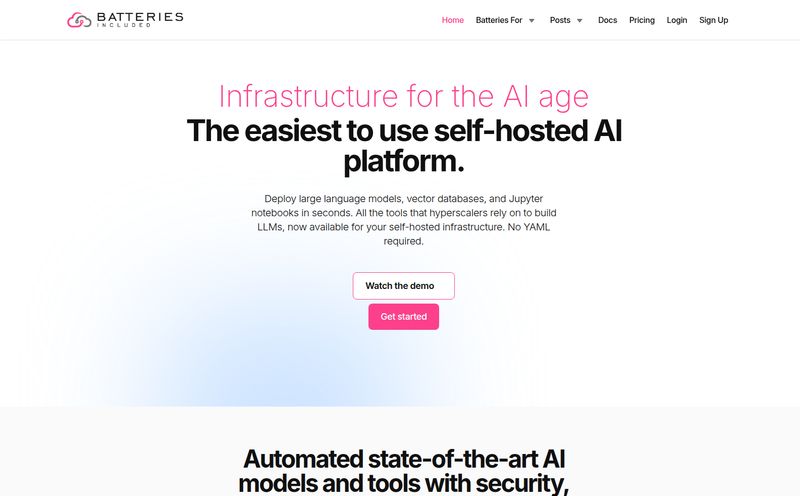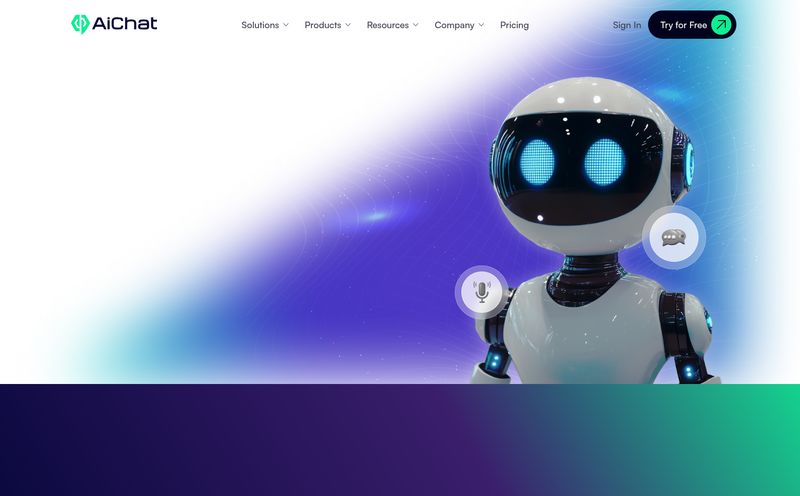We're all using AI. If you say you're not, you're either lying or you've been on a digital detox since 2022. From drafting emails to debugging code, tools like ChatGPT have become the office intern we never have to buy coffee for. But there's always that little voice in the back of your head, right? That nagging feeling when you paste a chunk of sensitive customer data or a snippet of proprietary code into a public AI tool. Where is this going? Who's seeing this?
I've been in the SEO and traffic game for years, and I've seen data privacy concerns go from a niche IT problem to a C-suite-level migraine. The stories are legendary—big-name companies accidentally leaking secrets through public AI. It's the kind of thing that keeps compliance officers up at night. So when a platform like Bourdain comes along with the headline, "Your Private ChatGPT 100% Inside Your Firewall," my ears perk up. Is it just marketing fluff, or is this the solution we've been waiting for?

Visit Bourdain
So, What is Bourdain, Really?
First off, Bourdain isn't just a single product. From what I've gathered, they're more of an AI consulting and implementation partner, with a serious focus on the eCommerce space. They aim to help brands streamline their messy workflows, pump up sales, and generally get their act together using AI and automation. Think of them as AI architects for your business.
But their crown jewel, the thing that caught my eye, is their Bourdain On-Site AI. This is their answer to the data privacy problem. It's a self-hosted, private language model that works like ChatGPT but lives entirely within your own secure environment. No data leaves your building. Nothing is sent to an external API. It's your AI, on your hardware, under your rules. For anyone in finance, healthcare, or any other regulated field, this is... well, it's a very big deal.
Why On-Premise AI is Suddenly a Game Changer
For a while, the consensus was that you had to use cloud-based AI to get the best performance. The idea of running a powerful LLM on your own terms seemed like a fantasy. Bourdain seems to be challenging that head-on.
Your Data Stays Put. Period.
This is the core promise. Bourdain claims 100% data residency. The language model, the vector database that stores your company's knowledge, and all the files it interacts with live exclusively on hardware you control. They boast zero API calls to external systems. This is like choosing to build your own Fort Knox instead of renting a safety deposit box from a bank you've never met. You hold all the keys.
Ready for the Auditors
If you've ever been through a SOC-2 or GDPR audit, you know it's not a walk in the park. Bourdain seems to get this. They've built in audit-ready logs, meaning every single query, every answer, and every source citation is recorded. When the auditors come knocking, you don't have to scramble; you just show them the logs. It turns a potential compliance nightmare into a simple box-ticking exercise. That alone is worth its weight in gold for many businesses.
Okay, It's Secure. But What Can It Do?
Top-tier security is great, but a tool has to actually be useful. A locked box with nothing inside is just... a box. Luckily, Bourdain's On-Site AI seems to be more of a Swiss Army knife.
The most immediate benefit is providing instant answers from your internal knowledge base. Imagine all your contracts, support articles, HR policies, and technical docs being instantly searchable with a simple question. Bourdain claims this saves the average knowledge worker over 5 hours a week. I believe it. The amount of time I've wasted hunting through shared drives for a single document is frankly embarrassing.
But it goes beyond a simple Q&A bot. It has built-in workflows. You can ask it to generate summaries of long documents, draft email reports, or even trigger alerts in Slack, all from inside the chat interface. This starts to blur the line between a search tool and a genuine AI assistant that actively helps you get work done. They also promise a surprisingly fast 7-day setup, which is aggressive for an on-premise solution. You can monitor everything from a live dashboard, keeping an eye on performance and usage metrics across different teams.
Who Should Be Looking at Bourdain?
Let's be clear: this is not a tool for solo bloggers or small side hustles. This is an enterprise-grade solution for a specific type of customer. If you're a startup on a shoestring budget, this probably isn't your first stop. However, if you're a growing eCommerce brand, a financial institution, a law firm, or a healthcare provider that's serious about integrating AI without compromising security, then you are exactly who Bourdain is talking to.
It's for the teams that have tried to make public AI work for sensitive tasks and have been burned, or for those who were too security-conscious to even try in the first place. It’s for businesses where a data leak isn’t just bad PR, it’s a potential catastrophe.
The All-Important Question: Bourdain's Pricing
Alright, let's talk about the price tag. Bourdain is transparent about its costs, which I appreciate. This isn't a cheap tool, but it's not trying to be. It's positioned as an investment in security and productivity.
| Plan | Price | Best For |
|---|---|---|
| Starter | $5,000 /month | Smaller eCommerce brands or startups ready to explore AI and map out opportunities. Includes the AI Readiness Assessment. |
| Pro | $7,000 /month | Growing brands that want to actively implement and scale custom AI solutions and process automation. |
| Premium | $15,000+ | Larger brands needing a full-scope, standalone AI project with custom development and ongoing optimization. |
Yes, those numbers might make you gulp. But when you compare it to the potential cost of a data breach or the cumulative salary hours saved across a large team, the ROI calculation starts to look a lot more reasonable. Their site also mentions a 50% lower Total Cost of Ownership (TCO) compared to public GPT, which is an interesting claim, likely factoring in API costs and other variables.
My Honest Take: The Good and The... Complicated
After digging in, I'm genuinely impressed by the concept. The unyielding focus on security and data residency is exactly what the market needs right now. It's a bold and necessary move away from the 'one-cloud-fits-all' model. I also love that they offer a comprehensive discovery process and strategic roadmap. They aren't just selling you software; they're selling a strategy.
However, potential buyers should be realistic. The price is significant, and this isn't a plug-and-play solution you can set up with a credit card in five minutes. It requires real collaboration across your marketing, finance, and development teams. The implementation timeline will depend on how complex your organization is. This is a serious project, not a weekend experiment.
Frequently Asked Questions
- Does my company's data really never leave our network?
- Based on their core promise, yes. Bourdain's On-Site AI is designed so that the model, your files, and all processing happen on your own hardware within your firewall. They explicitly state there are zero external API calls.
- How long does deployment actually take?
- They advertise a 7-day setup for a standard deployment. However, it's wise to assume this can vary. The more complex your internal systems and data sources, the more involved the setup process will be.
- Can we connect to external models like GPT-4 later if we want to?
- The FAQ on their site suggests this is a possibility. While the primary benefit is its self-contained nature, it seems they have options for hybrid models if a specific use case calls for it. You'd want to discuss this with them directly.
- What kind of ROI should we expect?
- The main ROI comes from two places: productivity gains and risk mitigation. They quote a saving of 5+ hours per week per user, which you can translate into salary cost. The other part of the ROI is the value of preventing a catastrophic data leak, which is harder to quantify but immensely valuable.
- Is there a free trial or a way to test it?
- Their site has a "Can we try it before we buy?" question in the FAQ, which suggests they have a process for pilots or demos. Given the enterprise nature of the product, you'll likely need to book a call and go through a qualification process rather than accessing a self-serve trial.
Final Thoughts
Bourdain AI isn't just another tool. It feels more like a statement. It's a bet that for serious businesses, data privacy isn't just a feature—it's the whole foundation. The platform seems to deliver on the promise of a powerful, private AI co-pilot that has its security clearance in order from day one.
If your company has been sitting on the AI sidelines, nervously watching everyone else play with powerful but public tools, Bourdain might be your signal to finally get in the game. It's not a small investment, but for the right company, the peace of mind could be priceless. It's an AI that works for you, and only for you.
References and Sources
- Bourdain Official Website
- Bourdain Pricing Information
- TechCrunch: Samsung bans ChatGPT after data leak (Illustrative example of the problem)



